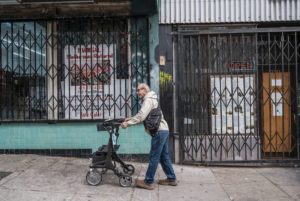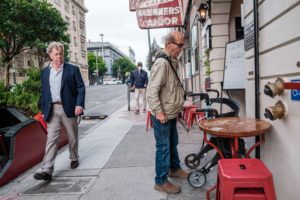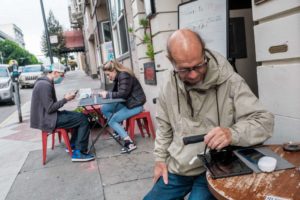‘It makes a humongous difference’: Lack of Wi-Fi in city SROs deepens residents’ isolation
(Pictured Above: Jack Huck, 72, uses an Android phone, but has no internet access from his longtime room in the Winton Hotel, a single-room-occupancy residence in San Francisco. The Wi-Fi gap leaves many people isolated. Photo by Nick Otto/Special to The Chronicle)
This story appeared in print and e-edition of The San Francisco Chronicle on October 7, 2021.
No one knew that Jack Huck lost weight during the pandemic.
Huck is 72 and lives alone in a room at the Winton Hotel for formerly unhoused and low-income residents in San Francisco. He rode out shelter-in-place isolation with only a cell phone to connect him to the outside world.
It wasn’t until May of this year, when Huck finally reunited with his social worker in person, that someone acknowledged his physical decline. At that meeting, Huck’s social worker suggested he get set up for Zoom calls.
“I was down and blue, not using a computer,” Huck said.
But like most single-room-occupancy hotels in San Francisco, Huck’s isn’t connected to Wi-Fi. Of the approximately 530 such hotels in the city, one of the country’s most technologically advanced, only a handful are Wi-Fi enabled. The hotels are mostly concentrated in the Tenderloin, Chinatown, South of Market and the Mission, neighborhoods with high immigrant and lower-income populations. And according to a 2016 report by the city’s public health department, 1 in 5 SRO residents in those neighborhoods is over age 65.
Lauren Cotter, spokesperson for the nonprofit Community Tech Network, which helps seniors get online, likened the internet access gap to the outlawed practice of denying services to residents of certain neighborhoods based on race.
“Just as there has been redlining, the same is true of internet access,” she said. “Cellular alone is not enough for people to be able to do all of the services necessary for their health.”
Huck moved into the Winton when he was in his 40s and has stayed because the building, which is in the Tenderloin, is rent-controlled.

Jack Huck, 72, who lives in the Winton Hotel, walks toward a coffee shop where he can connect to the internet. The lack of Wi-Fi access in city single-room-occupancy residences forces tenants like Huck to try and connect elsewhere. Nick Otto/Special to The Chronicle
“I’m pretty well locked in,” said Huck, who suffers from arthritis and uses a walker to get around.
He said he reached out to internet providers about hooking his building up to Wi-Fi but was told it’s not worth the cost. The issue wasn’t so important to him until the COVID-19 pandemic, when the internet became essential for so many services.
“The problem with broadband was always envisioned as being an issue for rural America,” said Bill Soward, executive director of ShelterTech, an organization that tries to solve technology challenges faced by people experiencing housing insecurity. “Urban areas have digital divide issues just as much as rural areas, and it requires an evolution in legislation.”
In 2020, ShelterTech outfitted the Mission Hotel, San Francisco’s largest SRO, with free Wi-Fi for all residents. It did so through grants and partnerships, including with the city of San Francisco, to bring fiber-optic lines from the street to the building. Soward estimates at least 20,000 residents across San Francisco and in hundreds of buildings are without Wi-Fi access. It’s a problem in cities nationwide.
The old age of the SRO buildings is in part to blame.
“Most of those are over 100 years old,” Soward said. “To wire the traditional way into each of the individual rooms would be very, very expensive.” He said he believes that’s one reason telecom companies are reluctant to bring in fiber, especially when many of the residents can’t afford the high cost of internet packages.

Jack Huck, 72, who lives in the Winton Hotel, prepares to sit at a coffee shop in San Francisco. The lack of Wi-Fi access in single-room-occupancy hotels forces residents like Huck to try and connect elsewhere. Nick Otto/Special to The Chronicle
Pratibha Tekkey, director of community organizing for the Tenderloin Housing Clinic, which manages 24 SROs in San Francisco including the Winton Hotel, said lack of access is a problem she hears about often.
“Many SRO residents, in my opinion, live in isolation,” Tekkey said. “Because of COVID, we found out that it makes a humongous difference if people have access, to at least give them a connection to the outside world.”
Tekkey said residents faced heightened mental health challenges during the pandemic with nowhere to find help. Now that so many resources and communications have moved online, the problem continues.
“Some of us take it for granted,” Tekkey said of Wi-Fi connection. She said she wasn’t aware of much momentum from the city to fix the issue comprehensively.
Previous attempts by the city to bring Wi-Fi to all residents, like former Supervisor Mark Farrell’s proposal to lay publicly controlled fiber optic broadband infrastructure beneath city streets, never came to fruition.
“I have no idea where it disappeared to,” Tekkey said. The proposal was shelved in 2018.
In July, Gov. Gavin Newsom announced a new $6 billion investment in broadband infrastructure. And the federal American Rescue Plan includes $350 billion to help cities and states expand broadband and other services, though some cities have expressed concern that the plan to distribute the funds favors rural areas over urban ones. Rey LaChaux, digital equity manager in the San Francisco Mayor’s Office of Housing and Community Development, said the city has discussed using $5 million of its allotted American Rescue Plan funds to connect 42 affordable housing sites officials have identified as the highest need to Wi-Fi.
Also in July, the governor’s Master Plan on Aging issued a progress report showing that the Department of Aging had distributed over 8,500 smart speakers to low-income older adults and is in the process of distributing 4,000 iPads with two-year data plans. The department also has promoted the federal Emergency Broadband Benefit, which the Federal Communications Commision put in place in May to help low-income households afford internet service during the pandemic. But the progress report does not mention providing internet hotspots or helping SROs or other low-income housing developments get connected.

Jack Huck, 72, who lives in the Winton Hotel, tries to connect his tablet to Wi-Fi at a coffee shop. The lack of Wi-Fi access in the hotel where he lives forces residents like Huck to try and connect elsewhere. Nick Otto/Special to The Chronicle
“We’re going to widen disparities,” said Karen Lincoln, founder and chair of Advocates for African American Elders, an outreach program run by the University of Southern California. She pointed out that only people who have access to Wi-Fi will get the full benefit of the free devices. Lincoln added that it’s often historically marginalized communities that are on the other side of the digital divide.
Huck briefly crossed that divide when he enrolled over the summer in a free computer training program for low-income older adults, which provided him with a tablet and a temporary Wi-Fi hotspot. Suddenly, contact with doctors, social workers and out-of-town family members was within Huck’s reach.
“When you can see somebody nice and clear,” Huck said, “it makes a difference.”
But the hotspot access ended once the course was done. He still has the tablet, but no way to use it at home.
His Android cell phone isn’t much of an alternative. Huck has an eye condition that makes it hard for him to read text on a small screen. He struggles with spelling and with typing on a tiny keypad.
Huck, who grew up in the Mission District and worked various jobs before retiring as a security guard at age 65, has never had Wi-Fi at home. For most of his life, Wi-Fi didn’t exist.
He thought about getting a computer in his retirement, but his brother in Nevada talked him out of it.
“‘You don’t want to spend your money on that,’” Huck recalls his brother telling him. ‘You’ve got to survive first.’”
Rent and health care are Huck’s biggest expenses, which he pays for with his Social Security income. He’s squirreled away some savings in case he ends up in the hospital. During the pandemic, when offered the unexpected opportunity to get a device, learn how to use it and get online at a discounted price, Huck jumped at the chance.
With his new digital skills, he plans to connect to Wi-Fi at coffee shops in his neighborhood. He said he’s grateful for the tablet, even if he has to leave home to use it.
Sofie Kodner is a writer with the Investigative Reporting Program at the UC Berkeley Graduate School of Journalism. The IRP reported this story through a grant from the SCAN Foundation. Email: katherine_kodner@berkeley.edu Twitter: @KodSof


